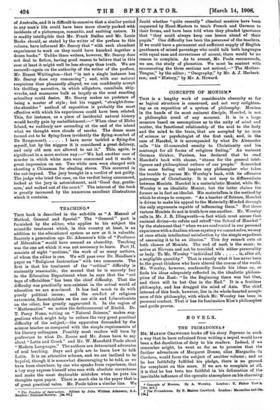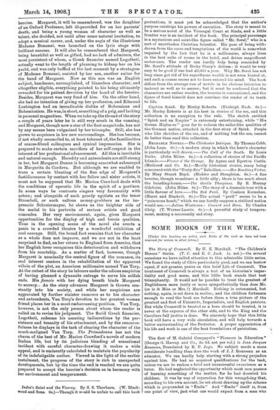NOVELS.
THE PRIMADONNA.t Mn. ittinioN CRAWFORD broke off his story Soprano in such a way that to have refrained from writing a sequel would have been a flat dereliction of duty to his readers. Indeed, if we remember aright, he went so far as to promise that the further adventures of Margaret Donne, alias , Margarita da Cordova, would form the subject of another volume ; and as he has faithfully fulfilled his pledge, there is no ground for complaint on this score. If we are to complain at all, it is that he has been too faithful in his delineation of. the inevitable influence of the operatic atmosphere on his charming: • Concepts of Monism. By A. Worsley. London: T. Fisher lJnw:n. [218. net t The Fri:madonna. By F. Marion Crawford. London: Macmillan and CO..- heroine. Margaret, it will be remembered, was the daughter of an Oxford Professor, left ill-provided for on her parents' death, and being a young woman of character as well as talent, she decided, not until after some natural hesitation, to adopt a musical career, and, under the aegis of the illustrious Madame Bonanni, was launched on the lyric stage with brilliant success. It will also be remembered that Margaret, being beautiful as well as gifted, had no lack of admirers, the most persistent of whom, a Greek financier named Logotheti, actually went to the length of planning to kidnap her on his yacht, and was only baffled at the last moment by a stratagem of Madame Bonanni, assisted by her son, another suitor for the hand of Margaret. Now as this son was an English subject, handsome, accomplished, of blameless character, and altogether eligible, everything pointed to his being ultimately rewarded for his patient devotion by the hand of the heroine. Besides, Margaret was very fond of him. On the other hand, she had no intention of giving up her profession, and Edmund Lushington had an ineradicable dislike of Bohemians and Bohemianism. He was, in short, something of a prig, and lacking in personal magnetism. When we take up the thread of the story a couple of years later he is still very much in the running, and Margaret, though now a star of the first magnitude, has not by any means been vulgarised by her triumphs. Still, she has grown to acquiesce in her new surroundings. She has become, if not wholly reconciled to, at least tolerant of, the familiarities of coarse-fibred colleagues and cynical impresarios. She is prepared to make certain sacrifices of her self-respect in the interest of her professional advancement. All this is inevitable and natural enough. Heredity and antecedents are still strong in her, but Margaret Donne is becoming somewhat submerged in Margarita da Cordova. But although we are enabled to trace a certain blunting of the fine edge of Margaret's fastidiousness by contact with her fellow and sister artists, it must not be supposed that Mr. Marion Crawford deals with the conditions of operatic life in the spirit of a partisan. In some ways he contrasts singers very favourably with actors ; and alongside of such greedy egotists as .the tenor Stromboli, or such callous money-grubbers as the im- presario Schreiermayer, he shows us the brighter side of the medal in his portraits of serious artists and good comrades. Her very environment, again, gives Margaret opportunities for the display of high and heroic qualities. Thus in the opening scene of the novel she averts a panic in a crowded theatre by a wonderful exhibition of cool courage. Still, the broad fact remains that her character as a whole does not improve, and we are not in the least surprised to find, on her return to England from America, that her English lover recognises this deterioration and withdraws from his courtship. As a matter of fact, however, though Margaret is nominally the central figure of the romance, its real interest centres in the rehabilitation of the apparent villain of the plot, an American millionaire named Van Torp. At the outset of the story he labours under the odious suspicion of having planned a dynamite outrage to serve his selfish ends. His fiancee with her dying breath binds Margaret to secrecy.. As the story advances Margaret is thrown con- stantly into his society, and while her suspicions are aggravated by further sinister rumours as to his character and antecedents, Van Torp's devotion to her greatest woman friend places her in a most embarrassing position. Van Torp, however, is not the only person about whom the reader is called on to revise his judgment. The florid Greek financier, Logotheti, redeems his amazing indiscretions by the per- sistence and tenacity of his attachment, and by the resource- fulness he displays in the task of clearing the character of the much-maligned Van Torp. The Primadonna has not the charm of the best of Mr. Marion Crawford's novels of modern Italian life, but by its judicious blending of sensational incident with careful character-drawing it makes a wide appeal, and is eminently calculated to maintain the popularity of its indefatigable author. Viewed in the light of the earlier instalment, the progress of the story is rich in unexpected developments, but by the time the end is reached we are quite prepared to accept the heroine's decision as in harmony with her environment and temperament.











































 Previous page
Previous page